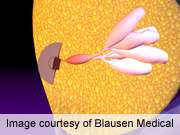(HealthDay)—Single-screening breast magnetic resonance imaging (MRI) detects 18.1 additional cancers after negative findings with mammography and ultrasonography (US) per 1,000 women with a history of breast cancer, according to a study published in the August issue of Radiology.
Hye Mi Gweon, M.D., from the Seoul National University College of Medicine in South Korea, and colleagues evaluated cancer detection rates, cancer characteristics and MRI performance characteristics in 607 consecutive women (median age, 48 years) with breast cancer who underwent breast conservation therapy (BCT). These women had negative mammography and US findings, and most underwent preoperative MRI examinations (91.8 percent).
The researchers found that MRI detected 11 additional cancers (18.1 cancers per 1,000 women). The positive predictive value (PPV) for recall was 9.4 percent (11 of 117 examinations), PPV for biopsy was 43.5 percent (10 of 23), and the sensitivity and specificity were 91.7 percent (11 of 12) and 82.2 percent (489 of 595), respectively. Age <50 years at initial diagnosis (P < 0.001) and more than a 24-month interval between initial surgery and screening MRI (P = 0.011) were independent factors associated with women with MRI-detected cancers.
"Our data suggest that women with a history of BCT for breast cancer may be appropriate candidates for breast MRI screening in view of the high detection yield for T1 invasive cancers, acceptable PPV," the authors write.
More information:
Abstract
Full Text (subscription or payment may be required)
Journal information: Radiology
Copyright © 2014 HealthDay. All rights reserved.






















